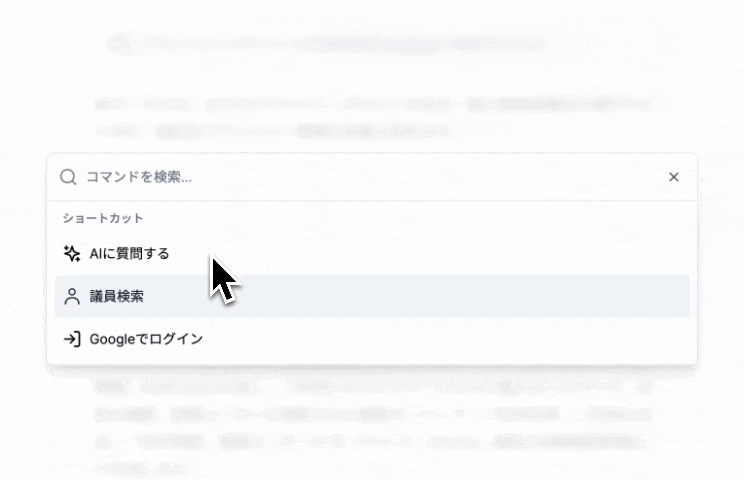ChatGPTのFunction CallingでUIを動的レンダリングしたら楽しかった
OpenAI が公開した Function Calling の API を使用すれば、定義した関数の情報を渡すことで、自然言語からどの関数を使用すべきかどうかを判定し、引数も json スキーマに従ってレスポンスしてくれます。
この情報を使って API クエリを実行し、レスポンスを元に UI を動的にレンダリングすれば、自然言語から UI が描画され面白いのではないかと思い実践してみました。
この例では、Function として OpenWeatherMapと REST Countriesを定義しています。
その他にも世界銀行の人口データからチャートを表示したりと、自然言語とコンピューター言語の融合がますます進みそうでかなりワクワクしました。

やりかた
今回は Next.js (App Router) と Vercel AI SDK を使用しました。全体的な実装は GitHub に載せているのでぜひご覧ください。
Vercel AI SDK をインストールする
Vercel AI SDK は Edge 環境で OpenAI の API を扱いやすくするためのラッパーです。他には、LangChain、Anthropic、Cohere、Fireworks、Hugging Inference API などなどにも対応しています。
なぜ Edge Runtime である必要があるのかというと、Vercel の Hobby プランのサーバーレス関数は Lamda の制限も相まって 10 秒でタイムアウトしてしまいます。
しかし、Edge であれば、最初のレスポンスを 30 秒以内に返せば現時点では特に制限はありません。
因みに、この SDK は Cloudflare Workers と Hono.js の組み合わせでも動作しました。
bun i openai ai
Function を定義する
functions.tsなどのファイルに、JSON スキーマ形式で Function の説明を定義し、実際の Function も定義します。
詳しい定義方法はドキュメントと型を見てください。
ちゃんとやる場合はエラー処理も書くと良いと思います。
import type { ChatCompletionCreateParams } from "openai/resources/chat/completions";
export async function runFunction(name: string, args: any) {
switch (name) {
case "get_current_weather":
return await get_current_weather(args["city_name"]);
case "get_country_info":
return await get_country_info(args["country_code"]);
default:
return null;
}
}
export const functions: ChatCompletionCreateParams.Function[] = [
{
name: "get_current_weather",
description:
"Learn about the current weather in your country or region from OpenWeatherMap",
parameters: {
type: "object",
properties: {
city_name: {
type: "string",
description: "Specify city name in English",
},
},
required: ["city_name"],
},
},
{
name: "get_country_info",
description: "Get country information from the REST Countries API",
parameters: {
type: "object",
properties: {
country_code: {
type: "string",
description: "cca2, ccn3, cca3 or cioc country code",
},
},
required: ["country_code"],
},
},
];
async function get_current_weather(cityName: string) {
const baseURL = "https://api.openweathermap.org/data/2.5/weather";
const queryString = `?q=${encodeURIComponent(
cityName
)}&appid=${encodeURIComponent(
process.env.OPENWEATHERMAP_APP_ID as string
)}&units=metric&lang=ja`;
try {
const response = await fetch(baseURL + queryString, {
method: "GET",
headers: {
"Content-Type": "application/json",
},
});
const data = await response.json();
if (!response.ok) {
return "Network response was not ok";
}
return data;
} catch (error) {
console.error("Error fetching weather data:", error);
return null;
}
}
async function get_country_info(country_code: string) {
const response = await fetch(
`https://restcountries.com/v3.1/alpha/${country_code}`,
{
method: "GET",
headers: {
"Content-Type": "application/json",
},
}
);
const data = await response.json();
return data[0];
}
API を作る
先程定義した Function と Vercel AI SDK で Edge で動く API を作ります。実際に使う場合は Redis などでキャッシュやレート制限を持たせてください。
experimental_StreamData で、SSE で追加データをストリーミングしています。
index はクライアント側でどのメッセージに対する追加データなどかどうかをマッピングするために必要です。
import OpenAI from "openai";
import {
OpenAIStream,
StreamingTextResponse,
experimental_StreamData,
} from "ai";
import { functions, runFunction } from "./functions";
export const runtime = "edge";
const openai = new OpenAI({
apiKey: process.env.OPENAI_API_KEY,
});
export async function POST(req: Request) {
const { messages } = await req.json();
const lastIndex = messages.length - 1;
const response = await openai.chat.completions.create({
model: "gpt-3.5-turbo",
stream: true,
messages,
functions,
});
const data = new experimental_StreamData();
const stream = OpenAIStream(response, {
experimental_onFunctionCall: async (
{ name, arguments: args },
createFunctionCallMessages
) => {
const result = await runFunction(name, args);
const newMessages = createFunctionCallMessages(result);
data.append({
type: name,
sources: result,
index: lastIndex + 1,
});
return openai.chat.completions.create({
messages: [...messages, ...newMessages],
stream: true,
model: "gpt-3.5-turbo-0613",
functions,
});
},
onFinal(completion) {
data.close();
},
experimental_streamData: true,
});
return new StreamingTextResponse(stream, {}, data);
}
クライアント側
あとはクライアント側のコンポーネントを実装するだけです。
追加データの index と message の index がマッチするアイテムを調べてコンポーネントにマッピングします。
"use client";
import { useChat } from "ai/react";
export default function Chat() {
const { data, messages, input, handleInputChange, handleSubmit } = useChat();
return (
<div className="mx-auto py-12 px-3 max-w-4xl">
{messages.map((m, i) => {
const correspondingData = data
? data.find((d: any) => d.index === i)
: null;
return <MessageItem key={i} m={m} data={correspondingData} />;
})}
<form onSubmit={handleSubmit}>
<input
className="w-full"
value={input}
placeholder="プロンプトを入力..."
onChange={handleInputChange}
/>
</form>
</div>
);
}
後は、typeフィールドを元にコンポーネントを条件分岐で描画を切り替えてあげればいいだけですね。
import { Message } from "ai";
import Weather from "@/components/weather";
import Country from "@/components/country";
import ReactMarkdown from "react-markdown";
import { MeOutlinedIcon } from "@xpadev-net/designsystem-icons";
import { SiOpenai } from "react-icons/si";
import clsx from "clsx";
export default function MessageItem({ m, data }: { m: Message; data: any }) {
return (
<div className="mb-5">
<div className="flex items-start">
<div
className={clsx(
"flex h-8 w-8 shrink-0 select-none items-center justify-center rounded-md border shadow",
m.role === "user" ? "bg-gray-100" : "bg-black"
)}
>
{m.role === "user" ? (
<MeOutlinedIcon
width="1em"
height="1em"
fill="currentColor"
className="h-4 w-4"
/>
) : (
<SiOpenai className="h-4 w-4 text-white" />
)}
</div>
<ReactMarkdown className="prose prose-neutral prose-a:text-blue-500 prose-a:no-underline hover:prose-a:underline prose-img:rounded-lg prose-img:shadow ml-4 max-w-none flex-1 space-y-2 overflow-hidden px-1">
{m.content}
</ReactMarkdown>
</div>
<div className="mt-5">
{data?.type === "get_current_weather" ? (
<Weather weather={data.sources} />
) : (
data?.type === "get_country_info" && (
<Country country={data.sources} />
)
)}
</div>
</div>
);
}
是非試して作ってみましょう!
Discussion
Vercel Edge Functionの裏側はCF Workersなのでそうですね
です!ベンダーロックじゃないのがいいですね